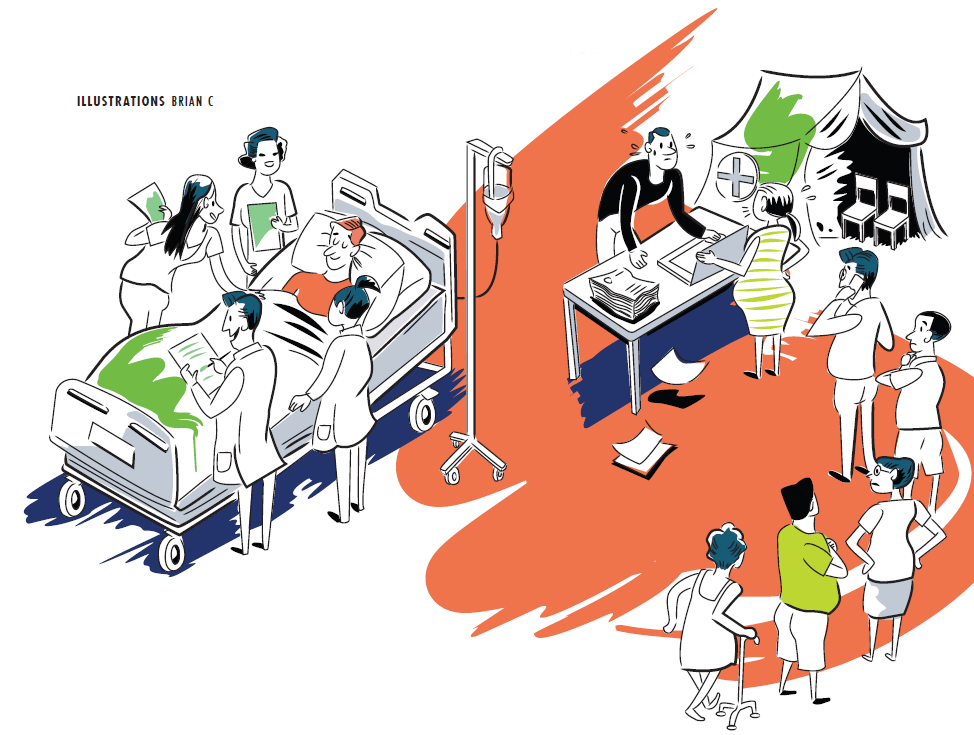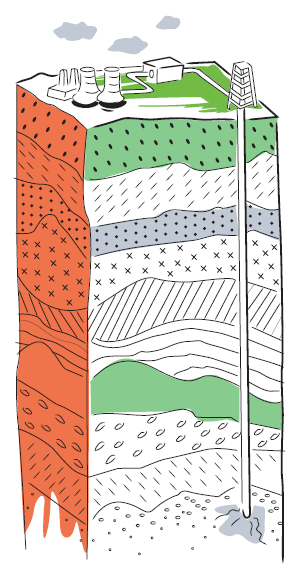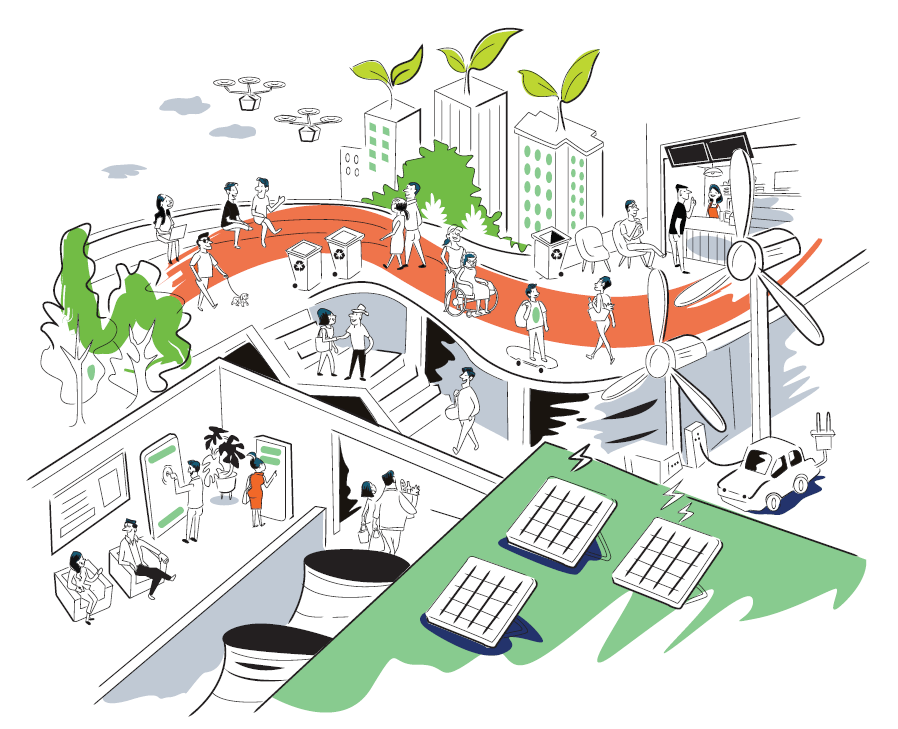Stories > A New World Order
A New World Order
The Bloomberg New Economy Forum held in Singapore witnessed the gathering of the world’s renowned thought leaders to discuss how collaboration among countries will help to steer the post-pandemic world.
BY RAHIMAH RASHITH

ssues of inequality, climate change and geopolitical tensions were in focus as global government representatives, heads of technology giants, finance and corporate thought leaders gathered for the Bloomberg New Economy Forum in Singapore in November 2021.
Navigating a pandemic-altered world where social issues have been further compounded to the disadvantage of already underprivileged sections of society, the event focused on key challenges ahead, possible solutions and a new paradigm of collaboration.
The three-day summit brought together approximately 300 public and private sector leaders from around the world. It featured speeches and panel discussions from speakers, including Singapore Senior Minister Tharman Shanmugaratnam, Microsoft Corp co-founder Bill Gates, US climate envoy John Kerry, and Sundar Pichai, chief executive officer of Google’s parent company, Alphabet Inc.
Besides the participation of influential personalities, the event was noteworthy for the fact that it was the first high-profile proceeding held in Singapore in a strict bubble while the city was still in the grips of the Covid-19 pandemic.
We examine a few of the panel discussions at the event that were decidely focused on the future.
Two-Speed Global Recovery: The Dangers of a Widening Rich-Poor Gap
Global recovery continues to face multiple challenges as the pandemic enters its third year. During a panel discussion on inequality, world leaders spotlighted the increasing richpoor divide that was further widened by Covid-19.
Tanzania’s vice president, Philip Isdor Mpango, called for greater support from the developed world and urged for an increased sharing of vaccine technologies, including screening and testing capabilities, and more aid from multilateral organisations.
“We ask the advanced world not to forget Sub-Saharan Africa because the challenge that we see is that while advanced economies are recovering relatively faster because they have the vaccines, we don’t have the vaccines,” he said.
Acknowledging the sharp disparity in vaccine access, fellow panellist Senior Minister Tharman said that underpinning this divide is a gulf in trust between the developing and developed world. He added that trust within some societies, institutions and even governments is weakening. “Trust in multilateralism is at an all-time low,” he commented. “And we have to be concerned about that. If Covid-19 has had a benefit, it is that it has illustrated, unfortunately, in a tragic way, that collaboration internationally is far, far less costly than not collaborating. And preparing in advance for pandemics and other crises is going to be far, far less costly than not preparing.”
PayPal CEO and fellow panellist Dan Schulman offered another solution to inequality, one that is “rooted in technology”. Noting that the world was forced to leapfrog into the digital era because of Covid-19, he said that many services have moved onto the mobile phone, opening up opportunities for companies to develop payment services that are easier and cheaper to access. “You can have all the power of a bank branch in the palm of your hand right now,“ he said.
“Trust in multilateralism is at an all-time low. And we have to be concerned about that. If Covid-19 has had a benefit, it is that it has illustrated, unfortunately, in a tragic way, that collaboration internationally is far, far less costly than not collaborating.”
Tharman Shanmugaratnam, Singapore Senior Minister

Assessing Global Health and Pandemic Preparedness
In a separate session, billionaire philanthropist Gates acknowledged the difficulty in getting countries to invest in pandemic preparedness. “We keep reminding people that this cost trillions, and it killed millions, that this is going to be the best insurance policy that anybody ever talked about compared to defence budgets, or fire departments or earthquake preparations,” he said.
To better prepare for the next pandemic, several thousand experts from the World Health Organization could be deployed to spot and fight infectious diseases readily, Gates shared. Investments in disease surveillance could help prevent future pandemics, he said, adding that surveillance systems should be able to function even when governments are dysfunctional or uninterested in sharing information.

Can Technology Save a Warming Planet?
Despite concerns over multilateralism and the ongoing Ukraine-Russia war that erupted three months after this conference took place, the exemplary cooperation among countries around the world to tackle Covid-19 has given impetus to renewed hopes that the world will band together once again to tackle the climate crisis. This optimism was shared by panellists during the session on climate change.
“There is no question that technology is the key (to averting climate catastrophe),” said Australia’s Trade, Tourism and Investment Minister Dan Tehan. “It is how we utilise technology collectively that ultimately decides whether we get to net-zero by 2050 or not. If we all try and solve it ourselves, it won’t work. We have got to use all the collective knowledge and technology we have and be prepared to share it (globally) if we are going to solve this,” he added.
By 2030, global temperatures are expected to rise to at least 1.5 degree Celsius above preindustrial levels unless the world starts to decarbonise, according to the United Nations’ 2021 Intergovernmental Panel on Climate Change report. As a result, in the next decade, over half of the world’s population – five billion – could be exposed to a climate hazard related to heat and water stress, drought and flood, up from 3.3 billion people today.
Panellists shared that evolving technologies, such as carbon capture and storage, along with green hydrogen offer new hope for mitigating climate change.
But CEO of Envision group Lei Zhang cautioned technology alone is insufficient in solving the climate crisis. “Technology still needs to be turned into scalable products and ‘iconic projects’, which is why collaboration and government policy support are essential,” said Zhang.
Reimagining the Urban Environment and Firestarter: The Singapore Model
Leaders discussed what the post-pandemic cities would look like during a panel discussion reimagining the future urban environment.
While Covid-19 has challenged cities and provided an opportunity to re-shape them, the essence and legacy of cities will still endure, said Professor Chan Heng Chee of the Lee Kuan Yew Centre for Innovative Cities, who is also Singapore’s Ambassador-at-Large.
“The city is there. You don’t knock down buildings. You have Reimagining the Urban Environment and Firestarter: The Singapore Model got to think of activities, new businesses and attractions to ginger up and bring life to the city. It is a fascinating challenge,” she said.
She further noted that London and Paris had undergone many changes over the years, yet still retain their character. Professor Chan added that rich and poor cities would face different challenges in recovering from the pandemic.
A fellow panellist, Yu Liang, founding partner of Chinese developer Vanke, said that cities should be established as self-sustaining units so that the entire system will not be affected when there is a disaster.
With the post-Covid city expected to be a city with hybrid-work models, some social interactions will be lost, creating a social deficit. Professor Chan suggests building more intimate and green spaces where people can socialise.

“It is how we utilise technology collectively that ultimately decides whether we get to net-zero by 2050 or not. We have got to use all the collective knowledge and technology we have and be prepared to share it globally if we are going to solve this.”
Dan Tehan, Australia’s Trade, Tourism and Investment Minister
Ultimately, communities and the relationships between people make cities resilient, the panellists agreed. This sentiment was echoed at a separate panel discussion highlighting the Singapore model in urban planning and housing policies.
Singapore’s former chief city planner, Liu Thai Ker, emphasised that the pandemic will not change a well-planned city, as cities traditionally have survived centuries of wars and pandemics. “When it comes to city planning, it is unlike the fashion industry where if today you buy something and if you don’t like it, you can just throw it away,” said Liu, who is widely recognised as the “architect of modern Singapore” for his extensive contribution to the country’s housing and urban landscape.
“You cannot do that with a city. City planners have to plan the city as a permanent creation.” He underscored two important housing policies the Singapore government emphasised in the ‘80s while he was working with the public housing agency, Housing Development Board. He said that the government was careful with the long-term planning of the mixed ethnic and income group housing policies.
“The ratios and limits for every building block, precinct and district were all carefully calculated. We took nine months just to make sure of that. It was done very, very carefully. And everybody understood there was a need to do so,” he said, explaining that the housing policy helped nurture a sense of common Singaporean identity.
